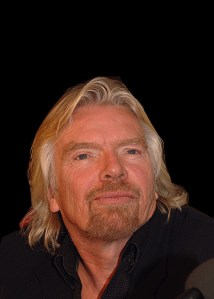
Virgin's Richard Branson. Courtesy The Carbon War Room
The UN climate summit will begin in Cancun, Mexico on November 29 with, um, slightly less ambitious goals than last year’s doomed mega-meeting in Copenhagen. Though analysts are hoping that the Cancun meeting could provide some useful progress on specific issues like avoided deforestation and climate aid, few people expect the summit to provide much forward progress on a global climate deal. At the same time the pledges countries have made so far on their own seem unlikely to prevent the worst effects of global warming—a just-released report from the United Nations Environment Programme calculated that current national pledges could, at best, deliver less than 60% of the global carbon emissions reductions needed to keep temperatures from rising 2 C. And that’s assuming countries like the U.S. keep emissions reduction pledges they’ve made, even though there’s no clear plan and no obvious political will to make those cuts.
Depressing news. But that makes the work of groups like the Carbon War Room all the more important. Launched by British entrepreneur Sir Richard Branson, the Carbon War Room is a green nonprofit with a twist—it looks at business on a sectoral level and looks at ways to decarbonize on an industry scale. Electricity, transport, shipping, land use—those are the theaters where Branson and his colleagues want to fight the war against carbon, by finding the greenest and most-efficient practices and disseminating them to the rest of business. Given the political paralysis on the global stage—and the total gridlock that is the U.S. legislative system—focusing on business in a big way might be one of the fastest routes to carbon cuts. (I spoke with Branson about the Carbon War Room at last year’s UN summit in Copenhagen.) “Business still does want to lead,” says Jigar Shah, the CEO of the Carbon War Room.
If you’re going to lead, then you need to identify some leaders. That’s what the Carbon War Room will be doing at Cancun. On December 4, as part of the World Climate Summit—a side event focusing on role of business on global warming—the Carbon War Room will launch the Gigaton Awards, which will honor individual companies across six major sectors: consumer discretionary, consumer staples, energy, industrials, telecommunications and utilities. Carbon War Room released the nominees today—mostly big names, like Toyota, Coca-Cola and 3M—basing the selections on emissions reductions over a year by year basis. But the individual winners will be selected by an independent mix of business and outside names. Winners get a trophy designed by Yves Beharfounder of the San Francisco design studio fuseproject—that contains a chunk of carbon inside a transparent case. Each winner will get to keep the trophy for a year before handing the award off to next year’s winner—sort of making the Gigaton Award the Stanley Cup of green business.
The Gigaton Awards grew out of the Gigaton Thowdown project by the entrepreneur Sunil Paul, who was looking for a way for business to create change on a massive level. (A gigaton is a billion tons of greenhouse gas emissions, or roughly 1/7th what the U.S. alone emitted in 2008.) It’s a recognition that while changes on the edges are all well and good, the sheer scale of the climate challenge demands responses that are similarly massive. “We have to find the economic players who are creating change on a major scale,” says Shah. “Otherwise you have to wonder if we’re making progress.”
Branson has had bold green ideas before—he’s invested in next-generation biofuels for his Virgin airline fleet and has offered millions in prize money to anyone who can solve the climate crisis. Obviously a multi-billionaire who runs a globe-spanning air fleet and owns a private island isn’t exactly the traditional model of an environmentalist. But in the global knife fight that is climate politics, it helps to have committed tycoons on the side of the greens—especially if they’re bringing good ideas along with their billions.


